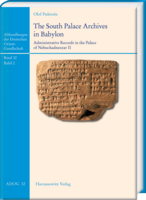|
Download:
The cuneiform archives in the South Palace of Babylon excavated by Koldewey from 1902 to 1903 and published here are the only administrative palace archives from the Neo-Babylonian period discovered to date. They provide a different view on Neo-Babylonian society than all the numerous private and temple archives, which have dominated the research up to now.
The 527 texts and fragments from the reign of Nebuchadnezzar II (604–562 BC) are published in transliteration and translation with corresponding photographs of the tablets available on the internet. These texts are the remains of the palace’s large-scale administration of staple foods: barley, dates, sesame oil and a number of other products. The texts describe the transportation, storage and deliveries of these goods. They give detailed information about their origin, amounts transported, the persons responsible, the storage locations and recipients of the deliveries. They show that the incoming products came from southern Mesopotamia and mostly reached Babylon on a large number of boats. Huge quantities of barley were stored in silos in Babylon, in the palace area and in other places, sometimes along canals. The largest recipients of the dates were a group of brewers. In Babylon, sesame oil was often given to foreigners from all over the empire and also guests from abroad. The largest individual quantity of oil was given to the biblical king Jehoiachin, who had been deported to Babylon by Nebuchadnezzar. |






